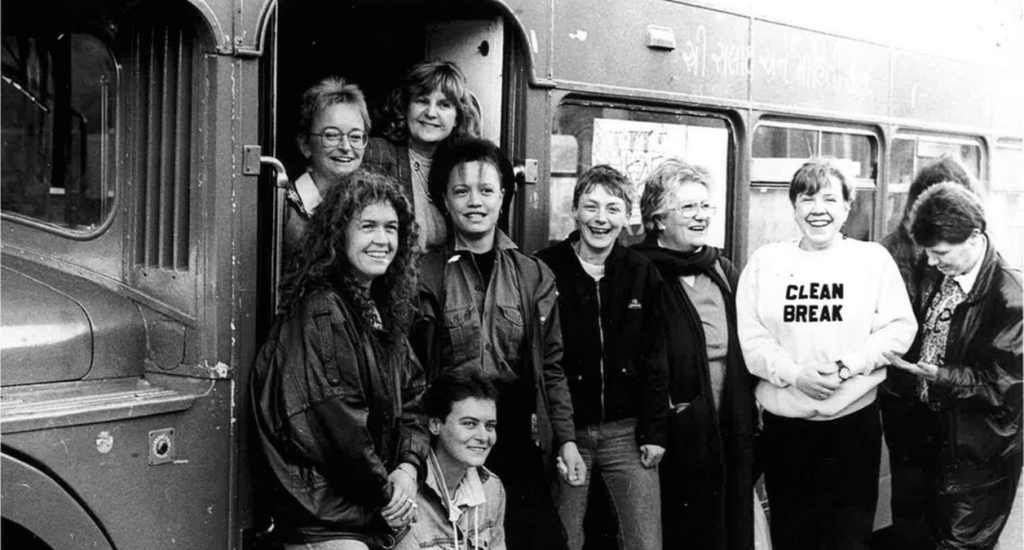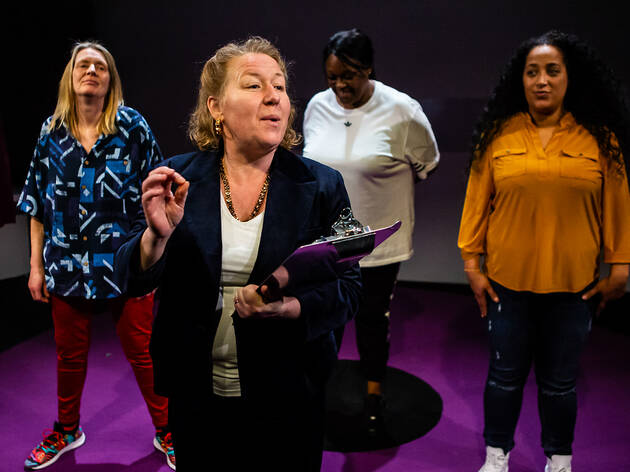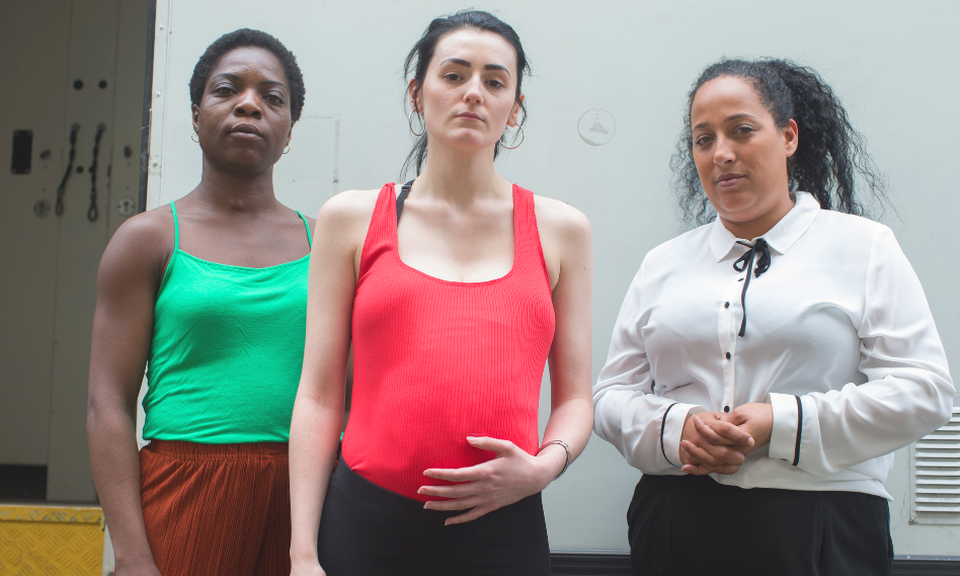MA Theatre for Community and Education students meet with Clean Break Theatre Company
As part of MA Theatre for Community and Education, students investigate the potential of theatre arts to address social, political and educational issues in a broad range of settings. Recently students took part in a workshop with the renowned Clean Break Theatre Company, to find out more about theatre in the criminal justice system. Read more about their experiences below and find out about the MA Theatre for Community and Education course here.
“My name is Beth and I am a student on the MA Theatre for Community and Education course here at Mountview. A few weeks ago, myself and my cohort took part in a 2-day training workshop with Clean Break, a women’s theatre company based in Kentish Town that work with women in the UK criminal justice system.
Clean Break was founded 40 years ago by two women in prison who believed in the power of theatre to transform lives and minds on stage, in prison and in the community. They use theatre to keep the subject of women in prison on the cultural radar, helping to reveal the damage caused by the criminal justice system. Clean Break as a company is solely made up of women and has a Members Programme available to women aged 17 and above who have lived experience of the criminal justice system or are at risk of entering it. The programme offers their Members a foundation of learning and skills in theatre performance, creativity and wellbeing through a trauma-informed and feminist approach. Clean Break uses a range of methods to support participants to achieve their full potential, which reflects much of our training here at Mountview. Through practical, theoretical and creative tasks, we explore the transformational power of theatre arts. We pay particular attention to collaborating with marginalised groups who might not otherwise have access to artistic, wellbeing or educational opportunities.

Unknown date and photographer. Picture featured in Clean Break’s “I am a theatre” exhibition, Swiss Cottage Gallery (2021). Taken from the Clean Break website.
In Clean Break’s workshop, facilitated by Artistic Director Anna Hermann and Artist/Member TerriAnn Oudjar, we took part in various practical and theoretical exercises to gain a holistic understanding of how Clean Break approach their Members, facilitate their trauma-informed work, inform their spaces, run their company and produce their artistic visions as informed by the real lives and experiences of women affected by prison. Anna and TerriAnn facilitated tasks that actively engaged us in critical analysis of theatre’s place in the criminal justice system. We played drama games focusing on connectivity, created theatre from various textual and experiential stimuli and engaged in insightful discussions around political legislation surrounding women in the UK criminal justice system. Many of the statistics have stayed with me.
- 62% of women in prison serve sentences of 6 months or less.
- 57% of them report experience domestic abuse, but 79% is considered a more realistic number.
- 48% of women in prison report offending to support another’s drug habit.
- For the women in prison with children, only 15% of the children end up staying in the family home
(Statistics from Clean Break).
This means that, in reality, Clean Break are working with women whose lives have turned upside down in the short space of 6 months, returning to unstable homes without adequate rehabilitation or support from authorities for their transition to life on the outside. These are the conditions under which Clean Break facilitators such as Anna and TerriAnn operate, and their success in transforming these women’s lives is demonstrated through the remarkable art and personal testimonies that Clean Break produces every year. One example of this is Clean Break’s acclaimed production Inside Bitch at the Royal Court in 2019, devised and performed by 4 Clean Break Members (TerriAnn being one of them, pictured below second from the left, confidently demanding our attention). Inside Bitch playfully explores the cultural representation of women in prison and how things aren’t quite as they seem on TV. From our testimonial discussion with TerriAnn, producing this show sounded like both a challenge and a delight! I imagine the same can be said for the rest of Clean Break’s productions.

A production shot from Clean Break’s ‘Inside Bitch’ at the Royal Court (2019). Photographed by Ali Wright.
Not only did this workshop teach us so much about the bleak reality of women’s lives in the UK criminal justice system, but we also got to experience Clean Break’s facilitation methodology first hand. Experiencing Anna and TerriAnn’s facilitation helped us as trainee applied theatre practitioners by expanding our toolkit of techniques, approaches and games to engage participants in a workshop, which is integral to our course. Our workshop with Clean Break was not the first time we had interacted with the UK criminal justice system at Mountview, as last term we received training from Saul Hewish, Artistic Director of RideOut (Creative Arts for Rehabilitation). RideOut develop arts-based approaches, rehabilitative workshops and creative projects within prisons across the UK. Like Clean Break, RideOut operate both within prison walls and beyond to encompass issues of national concern, engaging the public in discussion about the form and function of the UK criminal justice system, contributing to the rehabilitative transformation of Members and the growth of a safer society.

A production shot from Clean Break’s ‘Sweatbox’ at Essex Book Festival (2020). Taken from the Clean Break website.
Clean Break are a theatre company that use community-focused efforts to tackle issues of wellbeing, addiction and violence for women in the criminal justice system. They thus operate as a non-policing alternative to government-backed authorities, which naturally led to a group discussion in our workshop about whether ‘defunding the police’ would provide more funding for Clean Break’s efforts (of which Anna’s answer was ‘yes’). ‘Defunding the police’ is a widespread movement that has gained much dialogical traction since the Black Lives Matter protests of May 2020 and it demands the redistribution of police funds for community-focused services. It is part of our training as aspiring facilitators to learn about how money moves around the arts industry, how we can sustainably source the funding required to produce community-focused projects and how established theatre companies such as Clean Break and RideOut are able to produce informed work for community transformation. Outside of our workshops with visiting theatre companies, we spend time as a cohort studying the ideas of activists such as Ruth Wilson Gilmore and Angela Davis who offer a vision of total prison abolition and social reform. In critical consideration of their views and exploring how their proposed community-based alternatives might work in reality, we complete creative tasks such as imagining “a hypothetical perfect world where prisons don’t exist”. Whilst we might not come up with earth-shaking solutions, by engaging with creative tasks and holding challenging discussions, we are able to consider how we might create work for causes of social justice, offering healing, wellbeing and transformation to marginalised people who are affected by the criminal justice system. Our workshop with Clean Break perfectly complemented these discussions and I would urge you to engage in the crucial and remarkable community work they produce, which you can read about here.”
Written by Beth Carter, MA Theatre for Community and Education Student.
